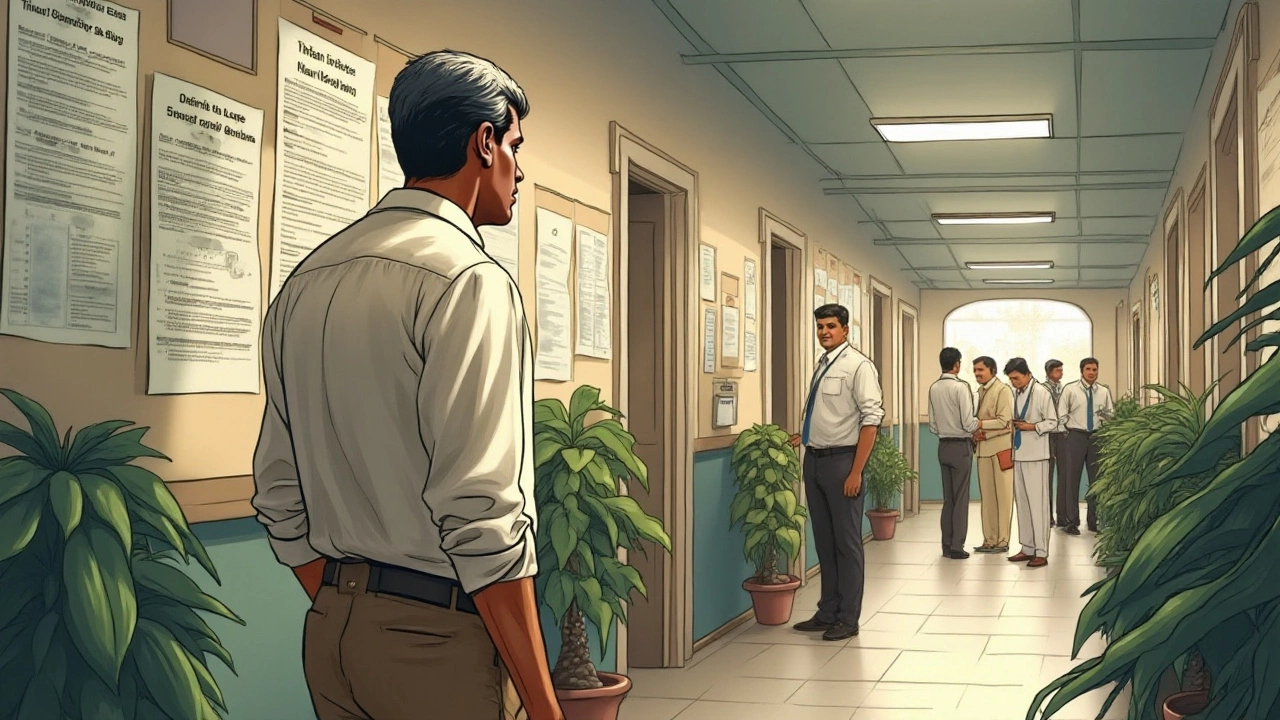When people talk about government jobs, the conversation often circles around job security and stability. For many, it's a career path that promises a steady income and a stress-free work environment. But how true is this perception?
There are various aspects to consider when we talk about the security of a government role. It's not always as simple as being immune to job loss. Performance issues, policy changes, and even major economic shifts can impact job stability.
In this exploration, we will shed light on what can lead to the loss of a government job, how you can protect your position, and dispel some common myths about government job security. Let's dive into the details that many aspiring and current public sector employees ought to know.
- Understanding Government Job Security
- Reasons Behind Job Loss in Government Positions
- How to Safeguard Your Government Job
- Myths and Facts About Government Job Stability
Understanding Government Job Security
The allure of a government job often lies in its perceived stability and predictability. Unlike private sector positions, where market dynamics can lead to sudden layoffs, public sector roles have a longstanding reputation for providing a safety net. Yet, this doesn't imply absolute immunity from job loss. Understanding the framework that governs job security in government employment is crucial for both aspirants and current employees. This framework comprises regulations, performance expectations, political factors, and unionized environments, all interplaying to create the layer of job security often touted in conversations. But how exactly do these elements contribute to an individual's job permanence?
Job security in the government is typically bolstered by a civil service system that includes tenure protections, making it challenging to dismiss employees without justified reasons. These protections, deeply rooted in regulations, aim to ensure fair treatment and stability. Yet, despite these safeguards, there are variables such as budget cuts and departmental restructuring that pose potential risks. More intricately, internal evaluations can hold governmental employees accountable, requiring them to meet certain performance thresholds. Failure to comply consistently can lead to ramifications, challenging the narrative that government jobs are impenetrably secure.
A common mantra when discussing government jobs is that "permanent" often means more than just indefinite employment. It represents the promise of a structured career path guided by protocols designed to protect workers' rights. Decision processes related to hiring and firing heavily draw upon standardized policies rather than profit-driven motives. Yet, the impact of political changes cannot be underestimated. Shifts in leadership or policy direction can affect entire departments. Indeed, when administrations change, they often bring different priorities which can lead to adjustments in workforce requirements.
It's essential to note how public opinions and media play a role in how government employment is managed. Public accountability means that decisions impacting jobs can't be taken lightly. In the words of civil service reform advocate Dorothy Guyton, "Service comes with responsibility, and responsibility must ensure transparency."
"In government service, we hold a duty to both uphold the trust of the public and ensure that our workforce policies reflect the highest standards," Guyton reflects.Essentially, this means that while procedures are designed to be in favor of job security, they're also meant to adapt to the public's evolving expectations and the administration's response to them.
The statistics on public sector employment reveal a trend of stability over time, with annual turnover rates often being lower than those in the private sector.
| Sector | Turnover Rate (%) |
|---|---|
| Private | 20 |
| Public (Government) | 8 |

Reasons Behind Job Loss in Government Positions
Government jobs are often touted for their ironclad security, yet under certain circumstances, even these roles can be vulnerable. One of the predominant reasons for losing a government job is poor performance. Unlike the private sector, where appraisals and performance reviews may happen more frequently, government roles often have stringent and well-documented performance criteria. Although feedback may not be as immediate, the expectations are clearly defined in employee manuals and policies. Failure to meet these expectations consistently over time can lead to progressive disciplinary actions and potentially, termination.
Another less spoken yet critical reason is structural changes within governmental departments. With each changing government administration, different priorities and policies can come into play, often leading to reorganizations. These changes might result in job cuts, especially if certain roles are no longer deemed necessary under new directives. This phenomenon is known as "downsizing" and while it doesn't reflect an individual’s performance, it is a stark reality some public sector employees might face.
Financial constraints also play a significant role in government job security. During times of economic downturn or budget cuts, state and federal agencies might find themselves with no recourse but to pare down their workforce. For instance, during the global financial crisis in 2008, many local and state governments in the U.S. implemented hiring freezes, furloughs, and layoffs as a response to budget deficits. Such shifts are often unavoidable but do highlight the interconnected nature of government employment and broader economic health.
Policy violations are another critical factor that can jeopardize one’s secure government position. This can include anything from ethical breaches to breaking conduct codes or even more severe criminal offenses. Accountability is especially pronounced in government jobs, as employees are representatives of the state and held to a high standard of integrity. For instance, misuse of funds or confidential information has led to immediate dismissals in numerous documented cases.
Moreover, automation and technology developments are gradually morphing certain roles, rendering some positions obsolete. As the world rapidly digitalizes, there is an increasing expectation for employees to adapt to new technologies and modern methods of executing tasks. Government sectors are no different and are aligning themselves with digital transformations to improve efficiency. Failing to adapt to technological changes or refusing further training could thus indirectly risk one’s position.
An additional and sometimes underrated reason is insufficient resources being provided for professional development. While some agencies actively invest in training and further education for their employees, budget cuts might halt such programs, leaving employees without opportunities to enhance their skill sets. This stagnation can inadvertently make them less competitive amid peers who actively seek professional growth elsewhere.
To encapsulate the consequences of inadequate adaptation, one industry expert noted, "In a world where change is the only constant, staying still equates to moving backward. Government roles are shifting, and employees need to evolve with them." This sentiment reflects the underlying reality that government job stability, while robust, is far from impervious to the challenges presented by both internal and external changes.

How to Safeguard Your Government Job
Securing your position within the realm of government employment requires more than just fulfilling your assigned tasks. With the specter of economic changes and organizational restructuring often looming, it's crucial to adopt a proactive approach to preserve your job stability. A key factor is understanding government job security and aligning your performance with the expectations of your department.
Ensuring your skills are up-to-date is vital. Continuous learning and professional development can set you apart. Engage in courses and workshops offered by the department or seek external certifications relevant to your field. Not only do these endeavors boost your resume, but they also signal your commitment to growth and adaptability, traits highly valued in times of change. At the same time, consider diversifying your skill set. In an age where cross-functional knowledge is treasured, having a broad range of abilities can make you indispensable.
Establishing strong relationships with peers and supervisors is another cornerstone of job security. Effective communication often fosters a positive work environment and a support network, which can be instrumental during organizational upheavals. By maintaining an approachable demeanor and a collaborative mindset, you can create a professional reputation that others will vouch for when decisions about personnel cuts are on the line.
Staying informed about both internal and external factors that could impact your role is also important. This means keeping an eye on legislation that affects your department, as well as understanding broader governmental policies that may lead to shifts in focus or funding. Attending relevant briefings or engaging with policy changes can help preemptively address potential concerns and adapt to new directives.
"The secret of change is to focus all of your energy not on fighting the old, but on building the new." – Socrates
Demonstrating initiative is equally essential. Look for gaps or inefficiencies in your team's processes and suggest solutions. Volunteering for additional roles or committees that align with your interests and job function can also augment your profile. Taking on relevant challenges shows that you are willing to evolve alongside the department, bolstering your stature as a valuable team player.
Finally, understand the reasons behind job loss
When discussing the allure of government job stability, a plethora of myths surrounds this widely perceived notion. Among the most prevalent is the belief that a public sector role is virtually a guarantee for life-long employment. While these positions generally offer more security than private sector roles, it’s imperative to note that they are not entirely insulated from unforeseen circumstances. Factors such as departmental downsizing, budgetary constraints, and policy shifts can influence an employee’s tenure. Understanding this reality helps in deciphering the complex web of job security in the government sector. One could think of a public sector job as a sturdy ship navigating turbulent economic waters, not invincible, but certainly built to endure more than its private counterparts. Another myth often cited is that government employment comes with no performance expectations, allowing employees to shirk responsibilities without consequence. However, such a view is myopic and dismissive of the structured performance evaluation processes that many government entities employ. From probation periods for new hires to regular performance reviews, accountability is woven into the fibers of a public service career. Employees who underperform can face disciplinary actions or, in some cases, termination. An enlightening revelation from a report by the Office of Personnel Management suggests that while separation rates are lower in government roles, performance-based separations do occur, although rarely publicized. The idea that economic downturns do not affect government jobs is yet another myth. While public sector jobs can be somewhat protected, they are not immune to fiscal pressures. A government operating on a deficit might be forced to implement hiring freezes, reduce benefits, or in extreme cases, lay off workers. Between 2008 and 2013, several state and local governments in the United States reduced their workforce numbers due to budget constraints, a stark reminder that public employment is not entirely recession-proof. Maintaining an awareness of economic policies and financial states of relevant governmental bodies can provide valuable foresight into potential employment instability. Moreover, a common misconception is that career advancement in government jobs is sluggish and based solely on tenure. While seniority plays a role, advancement is frequently merit-based, considering an individual’s competencies, contributions, and educational qualifications. Employees can distinguish themselves by participating in specialized training, displaying leadership capabilities, or enhancing current skills. Many government agencies have frameworks in place that encourage career development through well-established pathways that promote upward mobility for deserving candidates. Finally, it is often assumed that losing a government job entails arduous administrative tasks and an endless labyrinth of procedures. In reality, while certain protocol is indeed followed to ensure fairness, the process tends to be more straightforward than mythical accounts suggest. Policies are in place to protect both employer and employee, ensuring that termination, when necessary, is justified and compliant with civil service regulations. Mythical perceptions that portray it as a nightmare scenario are overblown and not reflective of the structured nature of public sector human resources management.
Myths and Facts About Government Job Stability
"Perceptions on public sector employment are often skewed towards security, yet like any career, it demands diligence, skill, and adaptability." ― A. Smith, Career Consultant
